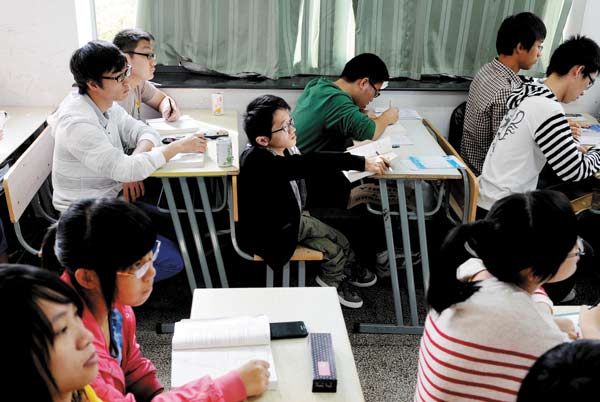 |
|
Wu Jia, born with brittle-bone disease, attends a class at the Institute of Jiaxing in Jiaxing, Zhejiang province. Wu was enrolled by the institute's economics department in 2012 with a score of 600 in the national college entrance exam. China Photo Press |
China's higher education is getting more accessible for the disabled, but students say more facilities for the mobility challenged are needed.
Zhang Haoyu, 25, a postgraduate student from a university in North China, suffers from osteogenesis imperfecta, a genetic and inherited disorder characterized by fragile bones.
He underwent five surgeries when he was a middle school student, and now he can walk with crunches, and often uses a mobility scooter.
| Aspirational artist |
"My university life is similar to that of a common university student," says Zhang. "My body has not limited me that much."
The Chinese language and literature major is one of the estimated 8,000 students with disabilities in China's higher-education system.
Higher education was opened to the disabled in China in the 1980s. According to the China Disabled Persons' Federation, from 2008 to 2012, about 35,000 physically challenged students were enrolled in universities, colleges and vocational colleges via the national college entrance examination.
With support from the federation, Changchun University in Jilin province established the country's first Special Education College in 1987, offering separate exams for people with hearing or visual impairment. About 16 Chinese universities have such colleges.
It's common for family members of disabled students to live at the university to help care for their loved one. Zhang's grandfather accompanied him for his first year of study, but returned home when Zhang proved he was able to lead an independent life on campus.
"I'm grateful that the university takes care of me in many aspects," he says.
When he was a freshman, the university built an accessible restroom in his dormitory especially for him and the other disabled student.
The newly built teaching and dormitory buildings all have accessible facilities, although some older buildings don't have them. The canteen also has an elevator and ramps.
If Zhang had a class scheduled to take place in a building without an elevator, the classroom will be changed to the first floor or another building with an elevator.
|
|
|
|
|
|
|
|
